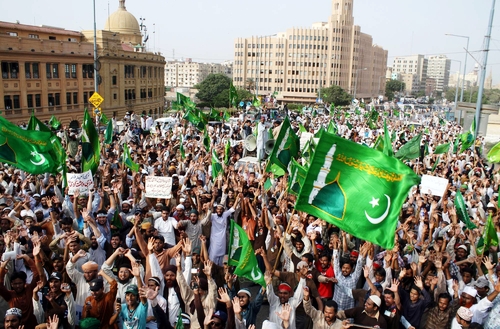On 27 March, thousands gathered in Islamabad’s twin city Rawalpindi to commemorate the Chehlum of Mumtaz Qadri, marking 40 days since his death. Qadri was executed for the 2011 murder of the governor of the province of Punjab, Salman Taseer, who opposed Pakistan’s blasphemy law. Many extremists in Pakistan welcomed the murder of Taseer and celebrated Qadri as a hero before and a martyr after his death.
Supporters of Qadri from all over the country were called on by two extremist parties, Sunni Tehreek (ST) and Tehreek-i-Labbaik ya Rasool (SAW), to march on the Parliament House in Islamabad, under heavy resistance of riot police and paramilitary forces.
In an attempt to hold back protesters, police fired tear gas into the crowds. When the protesters reached D-Chowk in the city’s Red Zone, the square in front of the Parliament House, the situation turned more violent as participants removed and torched containers and destroyed private and public property. Police officials later denied firing live rounds at protesters.
Around 1000 people were arrested and over a dozen injured. “We are considering imposing Anti-Terrorism Act Section 7 on these protesters”, City Police Officer Israr Ahmed Abbasi told Dawn Newspaper, referring to a law dealing with creating terror and violence in society. “A case has not been registered yet, but consultations with legal experts are underway.”
The protests were largely ignored by the media leading to a major lack of coverage. Media regulatory body Pemra warned channels to avoid coverage “driven by crass commercialisation like in India.”
At D-Chowk, nearly 2000 pro-Qadri protesters continued a sit-in, demanding the establishment of Shariah law, the release of arrested Sunni clerics and leaders, and a guaranty for the enforcement of Pakistan’s blasphemy laws. They also insisted that the government should officially declare Mumtaz Qadri a martyr.
Protesters ended the sit-in after four days, claiming the government had agreed to their demands, but interior Minister Chaudhry Nisar Ali Khan later denied any deal had been made.
Simon Engelkes studied political science at Freie Universität Berlin and American University of Beirut, with a focus on armed conflict and political violence. He is currently working as a research intern with a think tank in Islamabad. He tweets @englks.






